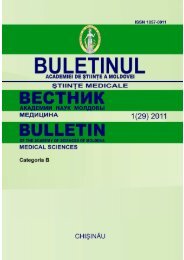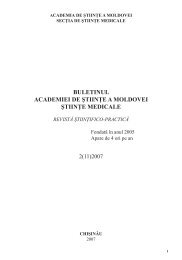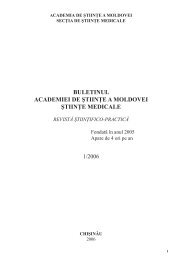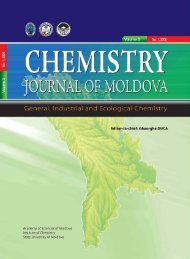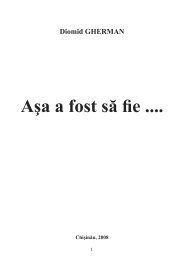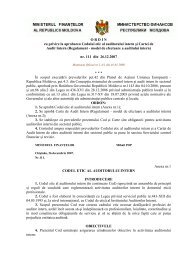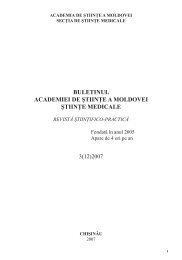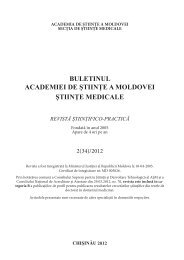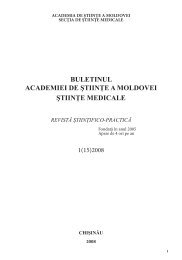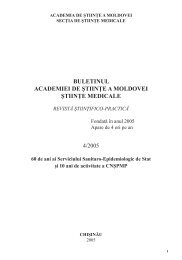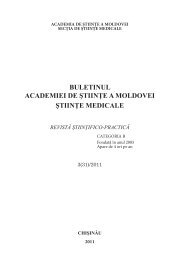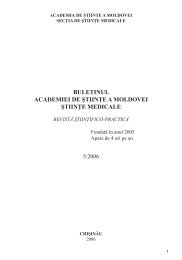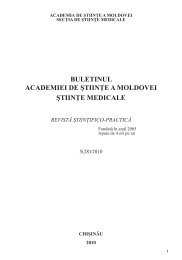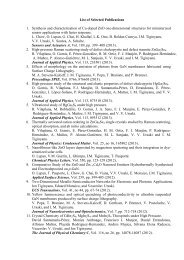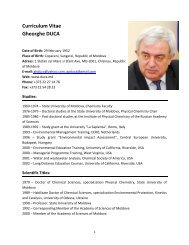stiinte med 1 2012.indd - Academia de ÅtiinÅ£e a Moldovei
stiinte med 1 2012.indd - Academia de ÅtiinÅ£e a Moldovei
stiinte med 1 2012.indd - Academia de ÅtiinÅ£e a Moldovei
You also want an ePaper? Increase the reach of your titles
YUMPU automatically turns print PDFs into web optimized ePapers that Google loves.
Ştiinţe Medicale<br />
afectează rinichiul. Protocoalele <strong>de</strong> tratament <strong>med</strong>ical<br />
au în ve<strong>de</strong>re administrarea pe termen lung a unei<br />
terapii profilactice a ITU, corectarea tulburărilor <strong>de</strong><br />
micţiune (a disfuncţiei vezicale), evaluarea imagistică<br />
periodică. Profilaxia antibacteriană continuă sca<strong>de</strong><br />
inci<strong>de</strong>nţa episoa<strong>de</strong>lor <strong>de</strong> PNF şi a cicatricelor renale<br />
postinfecţioase, atât în RVU <strong>de</strong> grad mic-<strong>med</strong>iu (gr. I-<br />
III), cât şi în ITU frecvente, în special dacă este vorba<br />
<strong>de</strong> pielonefrite acute la copilul mic [1,2,3].<br />
Concluzii<br />
1. Tabloul clinic al infecţiei urinare la copii <strong>de</strong><br />
vârstă fragedă este nespecific şi dificil <strong>de</strong> apreciat:<br />
imposibilitatea comunicării, lipsa acuzelor, incapacitatea<br />
<strong>de</strong> a localiza durerea, boala manifestându-se prin<br />
disconfort general, febră sau subfebrilitate prelungită,<br />
semne <strong>de</strong> excitare SNC, semne digestive frecvente.<br />
2. Cel mai frecvent infecţia urinară la copiii din<br />
lotul <strong>de</strong> studiu a fost provocată <strong>de</strong> bacterii gramnegative,<br />
prepon<strong>de</strong>rent E. Coli, urmată <strong>de</strong> Proteus, Klebsiella.<br />
3. La copiii cu ITU recidivantă, cu modificări la<br />
ecografia abdominală este necesară cistigrafia micţională.<br />
4. Diagnosticul timpuriu, tratamentul corect şi rapid<br />
al episodului <strong>de</strong> pielonefrită acută, urmat <strong>de</strong> uroprofilaxia<br />
pe termen lung în caz <strong>de</strong> asociere cu RVU<br />
au rol esenţial în prevenirea nefropatiei <strong>de</strong> reflux şi a<br />
complicaţiilor acesteia.<br />
Bibliografie<br />
1. Mihaela Bălgră<strong>de</strong>an. Refl uxul vezico-ureteral.<br />
Revista română <strong>de</strong> pediatrie, 2006; LV (1): 44-53.<br />
2. Bing Dai, Yawei Liu, Jieshuang Jia and Changlin<br />
Mei, Long-term antibiotics for the prevention of recurrent<br />
urinary tract infection in children: a systematic review and<br />
meta-analysis, ADC Online First, publishied on May 10.<br />
2010 as 10.1136/adc. 2009.173112.<br />
3. Craig C. J., Simpson M. J., Willians G. J. et al.,<br />
Antibiotic Prophylaxis and recurrent urinary tract infection<br />
in children, N. Engl J. Med., 2009; 361:1748-1759.<br />
4. Williams G., Craig C. J., Diagnosis and management<br />
of urinary tract infection. Comprehensive Pediatric<br />
Nephrology, ed. Mosby, 2008:539-548.<br />
5. Вялкова А.А., Гриценко В.А., Гордиенко Л.М.,<br />
Инфекция мочевой системы у детей. Нефрология.<br />
2009; 3, 11-112.<br />
6. Зыкова Л.С., Тухватуллина Э.М., Мотыженкова<br />
О.В., Особенности пиелонефрита у детей грудного<br />
возраста. Российский педиатрический журнал, 2003,<br />
2: 8-10.<br />
7. Игнатова М.С., Длин В. В., Приоритетные<br />
исследования в детской нефрологии. Рос. Вестн.<br />
Перинатал. и Педиатр.,2010; 55 (6): 62-67.<br />
417<br />
Rezumat<br />
Infecţia tractului urinar la copii este frecvent asociată<br />
cu factori favorizanţi antenatali şi perinatali, cu refluxul<br />
vezicoureteral. Germenii implicaţi în etiologia infecţiilor<br />
urinare au fost E. Coli, urmată <strong>de</strong> Proteus, Klebsiella. Evaluarea<br />
clinico-anamnestică completă a cazului şi ecografia<br />
reno-urinară sunt utile în <strong>de</strong>pistarea timpurie a afecţiunilor<br />
renale la copiii <strong>de</strong> vârstă fragedă, asigură diferenţierea dintre<br />
ITU necomplicată şi o posibilă uropatie malformativă.<br />
Tratamentul antibacterian al episodului acut <strong>de</strong> pielonefrită<br />
s-a efectuat cu cefalosporine generaţiile II-III sau cu aminopeniciline<br />
protejante, administrate i/m pe o durată <strong>de</strong> 2-5<br />
zile, apoi pe cale orală, cu o durată totală <strong>de</strong> 10-14 zile.<br />
Terapia profilactică antimicrobiană la copiii din studiu a<br />
inclus uroseptice – cotrimoxazol, furaghin, în complex cu<br />
antioxidante, fitoterapie, corecţia florei intestinale.<br />
Summary<br />
The study reveals that there are various risk factors<br />
(antenatal and/or perinatal risk factors, vesicoureteral<br />
reflux) for the <strong>de</strong>velopment and recurrent UTI in children.<br />
The most frequent pathogens isolated in children with<br />
UTI in this study were E. Coli (60,5±5,3%), followed<br />
by Proteus (24,7±4,6%) and Klebsiella (6,0±2,5%).<br />
The complete evaluation of anamnesic, clinic and USG<br />
of urinary sistem is useful in early diagnostic of kidney<br />
disease in infants. That gives posibility to diferentiate<br />
uncomplicated UTI and possible uropathy malformation.<br />
We recommend the use of third generation cephalosporins<br />
or aminopenicilines for the initial parenteral treatment<br />
of acute pyelonephritis in children, continued for at least<br />
48 h after patients become afebrile, then continued with<br />
oral antibiotic therapy for a maximum 10-14 days. In this<br />
study the continuous antibiotic chemoprophylaxis was<br />
ma<strong>de</strong> with cotrimoxazol, nitrofurantoin in association<br />
with antioxidants, phitotherapy and correction of intestinal<br />
microbiocenosis.<br />
Резюме<br />
Микробно-воспалительные заболевания почек у<br />
детей являются актуальной проблемой, факторами<br />
риска развития являются патология течения беременности,<br />
нефропатии в анамнезе, тератогенные факторы,<br />
сочетание пузырно-мочеточникового рефлюкса и нейрогенной<br />
дисфункции мочевого пузыря. Установлено,<br />
что самыми частыми возбудителями пиелонефрита у<br />
детей раннего возраста являются представители семейства<br />
Еnterobacteriaciae, cреди которых приоритетное<br />
место принадлежит E. Coli, далее Proterus, Klebsiella.<br />
Факторы риска, ответственные как за колонизацию и<br />
размножение микробов в почечной паренхиме, так и за<br />
персистенцию инфекции, это кишечный дисбактериоз,<br />
обструктивные уропатии, гельминтозы. Для оптимизации<br />
эффективности лечения пиелонефрита у детей необходима<br />
ступенчатая (парэнтерально 2-5, дней далее<br />
перорально до 10-14 дней) антибактериальная терапия<br />
острого периода, профилактическая противорецидивная<br />
терапия с выбором индивидуальных программ, в<br />
сочетании с антиоксидантной, антисклеротической терапией,<br />
коррекция нарушений уродинамики.



